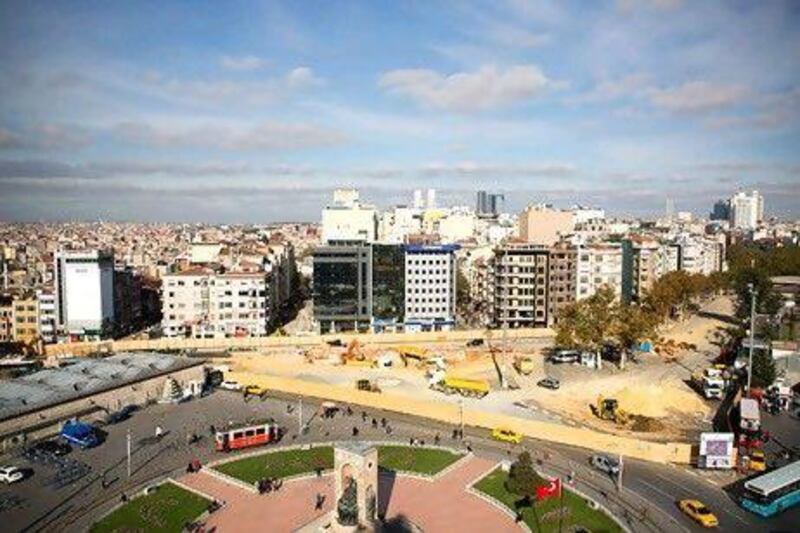ISTANBUL // Only a few weeks ago, Nejat Mutlu's mobile phone shop was humming along nicely, benefiting from its prime location facing Taksim Square, the heart of Turkey's metropolis Istanbul.
But now, Mr Mutlu is staring at a wall of high wood panels that shield a giant construction site outside his shop and have cut off the flow of customers.
"Business is down to zero," Mr Mutlu said this week as he was sitting in his empty shop with two assistants. Outside, dust and the noise of construction machines filled the air. "I just hope I can stay afloat," Mr Mutlu said.
Behind the panels, one of the most controversial urban modernisation projects ever undertaken in Istanbul was underway. Work started on November 5 and will block one of the busiest streets in the city for the next eight months.
The project's aim is to turn Taksim Square on Istanbul's European side, a major traffic hub, into a pedestrian area of 100,000 square meters, dominated by a reconstruction of a monumental 18th century Ottoman barracks building, with traffic flowing through tunnels underneath.
It is the latest in a series of urban renewal projects that have changed Istanbul in recent years, ranging from the complete overhaul of rundown neighbourhoods within the 1,500 year old city walls to the construction of a new metro bridge across the Golden Horn.
Changes are not limited to the city centre. A giant new airport is to be built north of the city in 2014, and a third motorway bridge across the Bosphorus is scheduled to be inaugurated in 2015. A huge new theme park with a capacity of 30 million visitors annually is to open next year.
The municipality, run by the religiously conservative Justice and Development Party (AKP) of prime minister Recep Tayyip Erdogan, says the changes reflect Istanbul's role as a showcase for the rising regional power Turkey.
But critics say projects involve bulldozing whole neighbourhoods rather than careful work to modernise them and are expressions of the ruling party's power and neo-Ottoman instincts.
The Taksim project is no exception.
The square is dear to Turkey's secularists because of its monument dedicated to modern Turkey's founder Mustafa Kemal Ataturk and the country's newly-found independence after the collapse of the Ottoman Empire. As a mayor of Istanbul, Mr Erdogan raised a storm of protest in the 1990s by proposing to build a mosque overshadowing the monument. The plan was later dropped.
Opponents of Mr Erdogan, who has thrown his weight behind the current Taksim project, say the AKP's new plans for the square and especially the reconstruction of the barracks that was rased in 1940, are kitschy and pompous.
"Stop seeing the Taksim from an ideological perspective," Mehmet Yildiz, a member of Istanbul's municipal parliament for the secularist Republican People's Party (CHP), the main opposition group in Turkey, told AKP deputies this week, according to news reports. He compared the reconstructed barracks building to "props for a western movie".
Media reports say the new Taksim will come with a museum, art galleries, shops, cafes, an ice-rink and perhaps a shopping mall, but Kadir Topbas, Istanbul's mayor, said this week no decision had been taken yet.
Mr Topbas said the Taksim project will transform the square from a mere transit hub to a place where "people have fun, get together and live". Critics of the project would be grateful once work was finished, he said.
Ahmet Misbah Demircan, mayor of the Istanbul district of Beyoglu that includes Taksim Square, predicted that "tourism will explode" in the area once the project is finished. Even now, property prices in the area have started to rise steeply, according to news reports.
Tugce Yilmaz, an estate agent who was crossing Taksim Square this week on her way to her office, agreed that despite a few months of problems for local businessmen like Mr Mutlu in his phone shop, the project was to be welcomed. "It is good for tourism in Istanbul," she said.
But not everybody is happy.
"It will be very ugly, with concrete and marble everywhere," said Murat Eker, a 35-year-old television writer who said his way to work took him past the wooden panels on the north side of Taksim Square every day.
Critics say the municipality started work on the project, priced at 52m Lira (Dh106m) for the tunnels alone, without consulting the public or the business community around the square.
"Efforts to reshape Taksim and the area around it should not be done in a piecemeal and top down way," said a protest group named Taksim Platformu on its website. The group called on Mr Topbas to stop the project immediately and convene a meeting with independent experts.
Meanwhile, Turkey's chamber of architects says it would take the authorities to court because work on the tunnels started without giving archeologists a chance to look for historical artefacts that might be hidden underground.
But Mr Erdogan said the AKP would stick to the project. "We are working to bring back history that has been destroyed," he said this week, in reference to the demolition of the barracks in 1940. "We will unite Taksim with its history."
tseibert@thenational.ae






